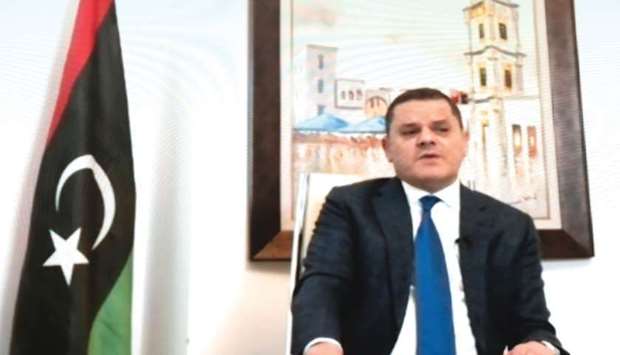Libyan delegates at UN-led talks outside Geneva yesterday made the surprise choice of Abdul Hamid Dbeibah as prime minister of a transitional unity government to take the war-ravaged country through to elections in December.
He was chosen along with a three-member presidency council to head a unity administration and steer the North African state towards the ballot box on December 24.
Dbeibah, a Canadian-trained engineer from the city of Misrata and founder of the Libya al-Mostakbal (Libya of the Future) movement, previously led the Libyan Investment and Development Company under dictator Muammar Gaddafi. The vote is part of a complex UN-led process aiming to build on a fragile ceasefire and end more than a decade of conflict.
Libya has been torn by civil war since a Nato-backed uprising led to the toppling and killing of Gaddafi in 2011. Acting UN envoy Stephanie Williams, who facilitated the week-long talks outside Geneva, said she was “pleased to witness this historic moment”. “The importance of the decision that you have taken here today will grow with the passage of time in the collective memory of the Libyan people,” she said after the vote.
Libya has been split between a Government of National Accord (GNA) in Tripoli, and the eastern-based House of Representatives, backed by military leader Khalifa Haftar. Haftar in 2019 launched a months-long campaign to seize Tripoli from pro-GNA forces, but was pushed back eastwards last year, leading to an October ceasefire and renewed political efforts for a more permanent peace.
On Friday the Libyan Political Dialogue Forum, comprising 75 participants selected by the UN to represent a broad cross-section of society, chose between proposed line-ups for the four leadership positions: prime minister and three presidency council members, each representing one of Libya’s three main regions. East Libyan diplomat Mohamed Younes Menfi, a former ambassador will head the council. His deputies will be Moussa al-Koni, a Touareg from Libya’s south, and Abdallah Hussein al-Lafi, from the western city of Zuwara.
And in the final run-off, Dbeibah’s list beat that of Fathi Bashagha, the GNA’s powerful interior minister, by 39 votes to 34.
Key powerbroker Aguila Saleh, the speaker of the Haftar-allied parliament based in the eastern city of Tobruk, was not elected to the transitional council. Analyst Wolfram Lacher, from the German Institute for International and Security Affairs (SWP), warned that “if this government becomes operational at all, its reach is likely to remain very limited,” adding that “the new executive will have very little traction, if at all, in the east.”
Even if the appointments are a step forward in the political process, the new executive will quickly have to assert its legitimacy among myriad local political actors, some of whom have already distanced themselves from the Geneva talks. It will also face the fact that multiple foreign forces still have a presence on Libyan soil.
GNA prime minister Fayez al-Sarraj, appointed at the end of a previous UN process in 2015, was in office for several months before he could even reach Tripoli by sea from Tunisia, due to security concerns. He has since gradually won the support of many militias, especially in the capital, but never managed to impose his authority across the divided country.

Abdul Hamid Dbeibah delivering a speech via video link during a meeting of the Libyan Political Dialogue Forum (LPDF).
